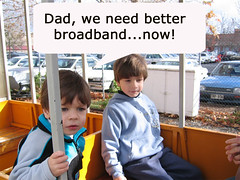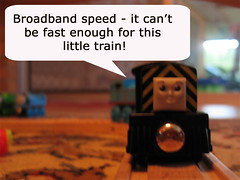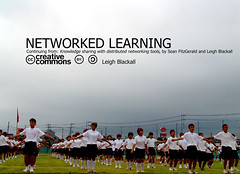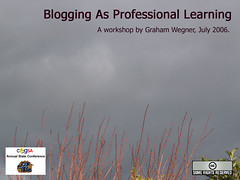I had a go at this last night but obviously didn't save the draft correctly because here I am having another go at wrapping up the rest of Friday's CEGSA Conference. I won't record any more on the Friday morning keynote - I was actually thinking of deleting the post but then Jason and Arti added comments before I could take action. It was very cool to meet and talk briefly with Derek Wenmoth - first person in my aggregator I've met who hails from outside Australian borders. He was also kind enough to stay for our joint presentation - CEGSA Educator of the Year, Al Upton and myself on "Blogging - 21st Century Learning Is Now!"
I'll start with that presentation. It was a real privelege to co-present with Al who was under a bit of pressure as he had to re-do his slides when they failed to copy properly from his USB drive earlier in the day. He talked at length about the future of learning touching on the next thing emerging (his term, in-world learning) with virtual worlds etc. He then moved into his classroom blogging and gave the audience of 30 or so a good overview of his blog and some of his students'. That left me a bit over 20 minutes for my part in order to keep to schedule so I fired up my new slideshow (download here - 4mb, or PDF version Blogging -21st Century Learning is Now! ) and away I went. With the influence of Daniel Pink's "A Whole New Mind", I used the Story of my blogging journey as a way of showing how it can be an effective tool for Professional Learning. I showed a quick snapshot of my original Blogger blog and related the transformation to my current edublog. If you do check out the slides, a bit of extra explanation will help. I talked about June last year during the interview for my current job when I was asked as a final question - What are the emerging technologies that will be important in education? The best I come up with - Interactive Whiteboards! I then told the story of how my blogging started with the fortunate discovery of Steve Dembo's Teach42, whose blogroll led me to David Warlick and then onto Will Richardson. I explained my methods of using blogrolls and public Bloglines accounts to populate my own Bloglines account. I expanded on the content of my blog and revisited my importance of comments to the conversation diagram. I highlighted how comments can breathe purpose and enthusiasm into a blog showing my first comment from Will that took me by surprise. I gave some other example of blogosphere conversation - being featured in a post by Christian Long, my extended comments conversation with Leigh and Alex, and my dabble in the TLF debate in the comments section of Artichoke. I wound up with the following conclusions:
What's In This For Educators?
- Opportunity for online presence without technical knowhow
- Professional dialogue with others worldwide when you want it on topics of your own choosing
- “Big picture" perspective
- Find out about new technologies and practices first
- Solve your own education based problems while contributing solutions for others
What's the potential?
- Grassroots influence on future directions here in South Australia
- Teachers making better use of their time by sharing resources and idea
- Gain experience in the openness of Web 2.0 technologies so that students gain the benefit of informed, net savvy teachers modelling appropriate use in their learning
- Teachers having access to their own just-in-time Professional Learning
Hopefully, it went OK.
Rest Of The Wrap Up.
Yvonne Murtagh's Presentation on Web 2.O.
Yvonne has been a source of inspiration and support for me as I've become more involved in this brave new online world. Her workshop last year The Magic Of RSS gave me a real boost along in my blogging exploits and she has promoted my efforts much more than I deserve. She went to both my workshop and presentation as a supporter, as there wasn't anything I was saying she didn't already know! So as a measure of respect and mutual support I went along to her workshop and I knew I'd learn something new as well! She used Bob Dylan as a starting metaphor to explain the emergence of Web 2.0 and the online apps that have been generated - Web 2.0 list. Interestingly, we had a handful of audience participants who had never heard of del.icio.us. One of her real passions is the concept of mashups - and showed us one that mashed a GoogleMap of New York with audio files geocached to specific locations. All of her presentation resources were tagged in true Web 2.0 style @ http://del.icio.us/tag/CEGSAmyweb2 including the Coming of Age document. She then demonstrated her FeedReader. (I still feel that desktop based apps like this are limited - because you can only access it on that particular computer and the feeds can't be shared.) An excellent presentation that ran well overtime because Yvonne had us all enthralled and she has so much to share. Thanks, Vonnie!
Karen Church's Online Gaming Workshop
Basically, my first ever dabble at playing World Of Warcraft. I've steered clear from gaming, not because I don't believe that they don't have educational value (quite the contrary) but because I know getting involved will suck hours out of my life I would like to invest elsewhere. I reckon my blogging would suffer for a start! Anyway, I managed to slaughter 8 wolves and earn a pair of gloves in 20 minutes. At least now I know what the fuss is about.
Parting Thoughts
The free wireless was great, allowing me to be one of two people blogging live, although Vonnie uploaded pics to Flickr throughout the event.
Leigh Blackall's ears must have been burning in Dunedin throughout the past two days because I heard his work referenced in at least three presentations and several conversations.
As usual, conversation between events with other educators was a real highlight. Maybe we can get next year's event up on Hitchhikr.
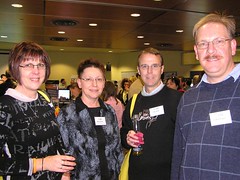
Photo from SouthOz's Flickr Photostream
Me on the right, Kay Clifford (eTeacher) on left, Anne De Nicolo and Colin Becker near the wine when the pic was taken at Thursday's Happy Hour. Thanks Al, for filling me in.

